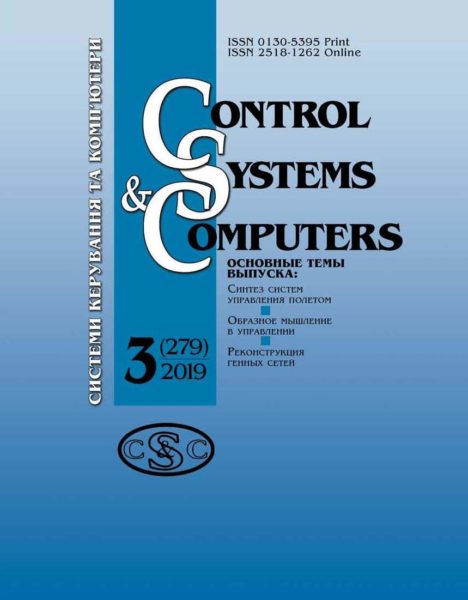Control Systems and Computers, N6, 2018, Article 6
DOI: https://doi.org/10.15407/usim.2018.06.081
Upr. sist. maš., 2018, Issue 6 (278), pp. 81-92.
UDC 364.2:331; 681.513
Tutova Olena V., PhD (Econ.), Research Associate, olenatutova@gmail.com,
Savchenko Yevgeniya A., PhD (Eng.), Senior Research Associate, savchenko_e@meta.ua, https://orcid.org/0000-0003-4851-9664,
International Research and Training Center for Information Technologies and Systems NAS and MES of Ukraine, Glushkov ave., 40, Kyiv, 03187, Ukraine
Assessment of Influence of Digital Economy Development on Social and Economic Environment
Introduction. One of the key characteristics of the digital revolution is that it is nurtured by a different type of innovation, increasingly based on digital technologies and on the new business models it allows. Under these newly formed condition it is important to estimate how digital economy development influence on economic growth.
Purpose. In order to assess interconnections between digital economy development and information and communication technologies as its background and economic growth in different countries of the world it is necessary to define what countries achieved the most significant progress in the rankings that characterize the level of development of digital computer technologies from the first editions of these rankings till the latest studies. In order to define these successful countries one should check how those countries decreased the distance from the countries with the best scores. Thus the countries that succeeded remarkably in the rankings of ICT Development Index, Networked Readiness Index, E-government development rank, E-participation Index and Knowledge Economy Index should be chosen. Then the dependency between the position of these countries in the rankings of digital economy and information and communication technologies and gross national per capita income as an indicator of economic growth in the countries should be analysed. Also the components of these indices will be determined in order to define the most influential of them from the point of view of the gross national per capita income.
Methods. By the development of this procedure the combinatorial GMDH algorithm and regression analysis are used to build these models.
Results. Six countries were chosen as those that achieved significant progress by all five or four rankings. The interconnection between their position in these rankings and their gross national income were analysed. Also the way how the components of these indices influence gross national income in these countries was examined.
Conclusion. The results of this research show that there is a direct dependency of indices values and gross national per capita income. Nevertheless, the bigger income grows the weaker the dependency of the indices values on it. It means that the increase of financial investments in information and communication technologies causes the growth of the indices only till the certain level.
Download full text! (In Ukrainian)
Keywords: Data Analysis, Modeling, E-Government, Human development level.
- Digital Russia: a new reality, July 2017. Digital McKinsey. [online] Available at: <https://www.mckinsey.com/ru/~/
media/McKinsey/Locations/Europe%20and%20Middle%
20East/Russia/Our%20Insights/Digital%20Russia/Digital-
Russia-report.ashx> [Accessed 16 Oct. 2016]. (In Russian). - Human Development Report 2015. Labor for Human Development. [online] Available at: <http://www.un-ilibrary.org/economic-and-social-development/2015_a38c8a2e-ru> [Accessed 12 Oct. 2016]. (In Russian).
- The ICT Development Index (IDI): conceptual framework and methodology. [online] Available at: <https://www.itu.int/en/ITU-D/Statistics/Pages/publications/mis2017/methodology.aspx> [Accessed 6 Apr. 2017].
- Networked readiness index. [online] Available at: <http://reports.weforum.org/global-information-technology-report-2016/executive-summary/> [Accessed 16 Oct. 2016].
- UN E-Government Knowledgebase. [online] Available at: <https://publicadministration.un.org/egovkb/en-us/Data/Compare-Countries> [Accessed 16 Oct. 2016].
- Measuring Knowledge in the World’s Economy development. [online] Available at: <http://web.worldbank.org/archive/website01030/WEB/IMAGES/KAM_V4.PDF> [Accessed 16 Oct. 2016].
- Human Development Data (1990-2017). [online] Available at: <http://hdr.undp.org/en/data> [Accessed 16 Oct. 2016].
- Tutova, O., Savchenko, Ie., 2013. “Modeling of Impact of Macroeconomic Indicators on the Growth of National Income”. Proceedings of 4th International Conference in Inductive Modelling ICIM 2013, Kyiv: IRTC, pp. 315-319.
- Ivakhnenko, A.G., Stepashko, V.S., 1985. Noise-immunity of modeling. Kiev: Naukova dumka, 216 p. (In Russian).
- Ivakhnenko, A.G., Savchenko, E.A., 2008. “Investigation of Efficiency of Additional Determination Method of the Model Selection in the Modeling Problems by Application of the GMDH Algorith. Journal of Automation and Information sciences”. Begell House. Inc. Publishers., 40 (3), pp. 47-58.
-
Received 04.12.18



